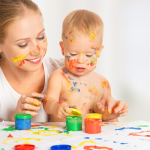In this section we will study in detail various Emotional Development and Social Development Milestones achieved by your toddler in his third year.

Emotional Development Milestones for toddlers 24 to 28 months
Encourage your child to share, this teaches him to consider other people. It will also help increase his socialization skills, which can be taught well through imitation. If baby is treated with respect and affection, he will treat others in similar manner.
At this age, you will have an advantage that your toddler wants to please you and hence through your relationship with him, he can learn to extend his considerations to others as well. Refer to this article for details “Getting your toddler to know other people have feelings too”.
Expressing Emotions
The emotional range of two year old is broad, extending from sheer delight to anger followed by frustration. While the ability to express emotions freely is considered healthy, your toddler needs to learn how to manage his emotions and which feelings are appropriate. This takes practice and needs your help.
Managing Emotions
Children may feel overwhelmed by the force of their emotions sometimes, hence the full blown tantrum. These situations need specific management skills, while trying to understand why such an upsurge of emotions. In many cases hunger, tiredness are culprit. So try to avoid such situations.
Otherwise best way to handle such situation is use distraction, simply divert your toddlers mind to an activity which he enjoys more and you will see positive emotions start flowing through.
Emotional Development Milestones for toddlers 28 to 32 months
Your toddler is getting more social with time, and it is evident with the fact that he has a friend circle with to play and enjoy. Forming relations outside immediate family circle is evidence of your child’s widening emotional development.
Expressing Pleasure
Now you will notice your child getting happy, excited for various things, identify such moments. Discuss them with your toddler, this will help him to explore his own feelings and emotions and understand himself better.
Other People’s Feelings
If your child learns at an early age, that his feelings are valued, it will eventually enable him to consider other people’s feeling in the same way. Respecting your child’s emotions and feelings in turn teaches him to respect another individual’s feelings and emotions.
Learn to Sharing
By this time, kids understand quite well what belongs to them and their possessions, but since we belong to social environment, we need to emphasize the importance of sharing and fun involved while doing same.
How sharing with others helps you make good friends and even allow you a more variety of toys to play with. But this needs to be inculcated with patience and respecting your kid’s feelings for his valued possessions.
Emotional Development Milestones for toddlers 32 to 36 months
At this age, tantrums in kids can be due to changes or events, or a learned response. Try to understand the underlying reason for such a response and maintain your cool. Once the tantrum is over, calmly communicate that his behaviour is not appropriate.
Emotional Frustration
Tantrums are usually linked to a child’s frustration and inability to communicate effectively. A two year old need to understand, that he cannot get everything. He cannot just demand all the time. The challenge of parenting is being attuned to your child so that you can accommodate his needs as they change.
The basic principle is to ignore negative or undesirable behaviour and to be generous in your praise and rewards of good behaviour.
Click on this article to know more on how to handle tantrums: “Taming Tantrums”.
Managing Separation
By this age, your child should be reasonably happy when separated from you with a familiar caregiver for an extended period of time, although some children manage this progression with less anxiety than others. Your child needs to be reassured that you will return back to him.
How you handle separation makes quite a difference, if you appear confident, you will convey to him your confidence in his ability to manage. If you are anxious or hesitant he may pick up on this emotion, which might make it more difficult for him to feel confident without you.

 Follow
Follow



